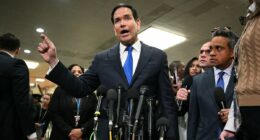Share this @internewscast.com
Unlock the White House Watch newsletter for free
US government bonds and stocks declined after a disappointing Treasury auction underscored investors’ concerns regarding the country’s increasing debt load, as Donald Trump strives to advance extensive tax cuts through Congress.
The yield on the 30-year Treasury increased by 0.11 percentage points to reach 5.096 percent during evening trading in New York, marking the highest level since late 2023, as bond prices dropped. This movement on Wednesday continued a multi-day upward trend in longer-dated Treasuries. The S&P 500 index decreased by 1.6 percent.
The new wave of selling emerged as Republican leaders in Congress engaged in vigorous discussions to push forward the US president’s tax plan to a House vote. Trump’s proposal, which he refers to as a “big, beautiful bill,” aims to extend numerous tax cuts from his first term in 2017 and is predicted by independent analysts to increase US debt by at least $3 trillion over the next decade.
House Speaker Mike Johnson said early on Wednesday that he was hopeful he could bring the bill to a vote in the chamber after striking an agreement with party holdouts over state tax deductions. But the deal drew a backlash from fiscal conservatives, who have lobbied for steeper cuts to spending on healthcare programmes and clean-energy tax credits.
The White House invited the far-right Freedom Caucus to hear their concerns on Wednesday afternoon and dispatched National Economic Council director Kevin Hassett to meet with other Republicans at the Capitol.
“The meeting was productive and moved the ball in the right direction,” press secretary Karoline Leavitt said.
The talks come just days after Moody’s stripped the US of its pristine triple-A credit rating on concerns over rising debt and deficits.
The US sold the debt on its $16bn auction on 20-year Treasuries with a 5 per cent coupon, the highest interest rate for 20-year bonds at auction since the maturity was reintroduced in 2020.
Primary dealers — banks that are obliged to sop up any bonds not absorbed by other investors — purchased 16.9 per cent of the offering, compared with an average of 15.1 per cent, according to BMO Capital Markets.
“We had a soft 20-year auction and when combined with the focus on the budget deficit, the market has a bias towards higher yields,” said Ian Lyngen, head of US rates strategy at BMO Capital Markets.
“Markets really have no appetite for duration here,” added Pooja Kumra, a rates strategist at TD Securities, referring to longer-dated securities.
“Especially in the case of the US, we expect all long-end auctions to be highly scrutinised by markets,” Kumra said, citing the budget bill.
Jay Barry, head of global rates strategy at JPMorgan, noted that “the equity market is finally starting to wake up to the fiscal issues facing the Treasury market”.
More than 95 per cent of the S&P 500’s member stocks were negative on the day. The financials, real estate and healthcare sectors were the benchmark index’s worst performers.
Compounding the decline was a sell-off in Big Tech stocks, after ChatGPT maker OpenAI said it had agreed to buy former Apple design chief Sir Jony Ive’s hardware start-up io for $6.4bn. The acquisition extends OpenAI’s bet on alternatives to smartphones.
News of the deal emerged around the same time as the results of the weak Treasury auction. Shares in Apple were down 2.3 per cent. Amazon, Nvidia and Microsoft all fell more than 1 per cent. The tech-heavy Nasdaq Composite was down 1.4 per cent.
The dollar index, tracking the US currency against a basket of peers, was down 0.6 per cent.







